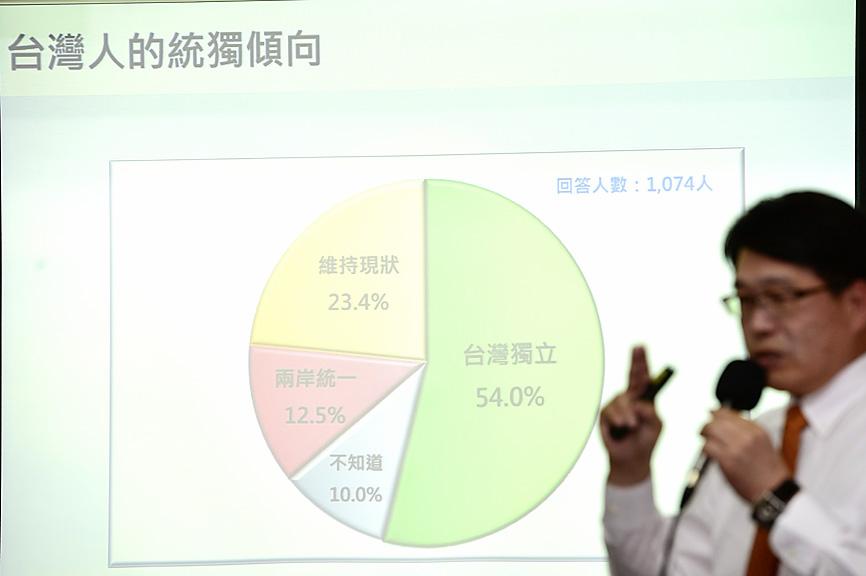Support for Taiwanese independence has spiked and most people do not fear that China would launch a military attack against the nation, the Taiwanese Public Opinion Foundation said at a news conference yesterday, citing a poll it conducted.
Among the people it surveyed, 54 percent said they support Taiwanese independence, 23.4 percent favored maintaining the “status quo,” 12.5 percent supported unification with China and about 10 percent gave no response or were unsure, the survey showed.
Of those who favored the “status quo,” 44.1 percent said they would back independence if pushed, 33.6 percent said they would continue to support the “status quo” and 22.3 percent said they would back unification, the survey showed.

Photo: George Tsorng, Taipei Times
Recalibrating the results using the breakdown of the “status quo” supporters showed that 64.4 percent of respondents ultimately supported Taiwanese independence, 7.9 percent backed the “status quo” and 17.8 percent favored unification with China, foundation chairman Michael You (游盈隆) said.
“In my research on public surveys on these issues over the past 30 years, this is the highest rate of support among Taiwanese for independence,” You said. “It is also the lowest figure for people supporting unification with China.”
The COVID-19 pandemic is an important factor pushing people to back independence, he said, adding: “I don’t know any other reasonable explanation for the results.”
Respondents were asked about Beijing having reiterated its resolve to invade Taiwan to deter movement toward independence and other threats, including Chinese aircraft intruding into Taiwan’s air defense identification zone.
Forty-three percent of respondents said they were afraid that China would attack Taiwan, while 55 percent said they are not concerned.
“Overall, 55 percent of people said that they do not fear that China would launch a military attack against Taiwan,” Taiwan Association for China Human Rights chairman Yang Sen-hong (楊憲宏) said. “This majority are courageous Taiwanese and the result is an interesting development.”
Asked about China approving national security legislation for Hong Kong and the British government proposing to permit 3 million Hong Kongers to apply for UK citizenship, 41.5 percent of respondents said that Taipei should follow London’s lead, while 50.5 percent said that the rules for Hong Kongers being granted Republic of China citizenship should not change.
Thirty-three percent said that the Council of Grand Justices’ Constitutional Interpretation No. 791, which effectively decriminalized adultery, was a good decision, while 60 percent disagreed with the ruling.
The poll was conducted on Monday and Tuesday last week among Taiwanese aged at least 20, collecting 1,074 valid responses. It has a margin of error of 2.99 percentage points.

UNILATERAL MOVES: Officials have raised concerns that Beijing could try to exert economic control over Kinmen in a key development plan next year The Civil Aviation Administration (CAA) yesterday said that China has so far failed to provide any information about a new airport expected to open next year that is less than 10km from a Taiwanese airport, raising flight safety concerns. Xiamen Xiangan International Airport is only about 3km at its closest point from the islands in Kinmen County — the scene of on-off fighting during the Cold War — and construction work can be seen and heard clearly from the Taiwan side. In a written statement sent to Reuters, the CAA said that airports close to each other need detailed advanced

Tropical Storm Fung-Wong would likely strengthen into a typhoon later today as it continues moving westward across the Pacific before heading in Taiwan’s direction next week, the Central Weather Administration (CWA) said. As of 8am, Fung-Wong was about 2,190km east-southeast of Cape Oluanpi (鵝鑾鼻), Taiwan’s southernmost point, moving westward at 25kph and possibly accelerating to 31kph, CWA data showed. The tropical storm is currently over waters east of the Philippines and still far from Taiwan, CWA forecaster Tseng Chao-cheng (曾昭誠) said, adding that it could likely strengthen into a typhoon later in the day. It is forecast to reach the South China Sea

Almost a quarter of volunteer soldiers who signed up from 2021 to last year have sought early discharge, the Legislative Yuan’s Budget Center said in a report. The report said that 12,884 of 52,674 people who volunteered in the period had sought an early exit from the military, returning NT$895.96 million (US$28.86 million) to the government. In 2021, there was a 105.34 percent rise in the volunteer recruitment rate, but the number has steadily declined since then, missing recruitment targets, the Chinese-language United Daily News said, citing the report. In 2021, only 521 volunteers dropped out of the military, the report said, citing

WEATHER Typhoon forming: CWA A tropical depression is expected to form into a typhoon as early as today, the Central Weather Administration (CWA) said yesterday, adding that the storm’s path remains uncertain. Before the weekend, it would move toward the Philippines, the agency said. Some time around Monday next week, it might reach a turning point, either veering north toward waters east of Taiwan or continuing westward across the Philippines, the CWA said. Meanwhile, the eye of Typhoon Kalmaegi was 1,310km south-southeast of Oluanpi (鵝鑾鼻), Taiwan’s southernmost point, as of 2am yesterday, it said. The storm is forecast to move through central